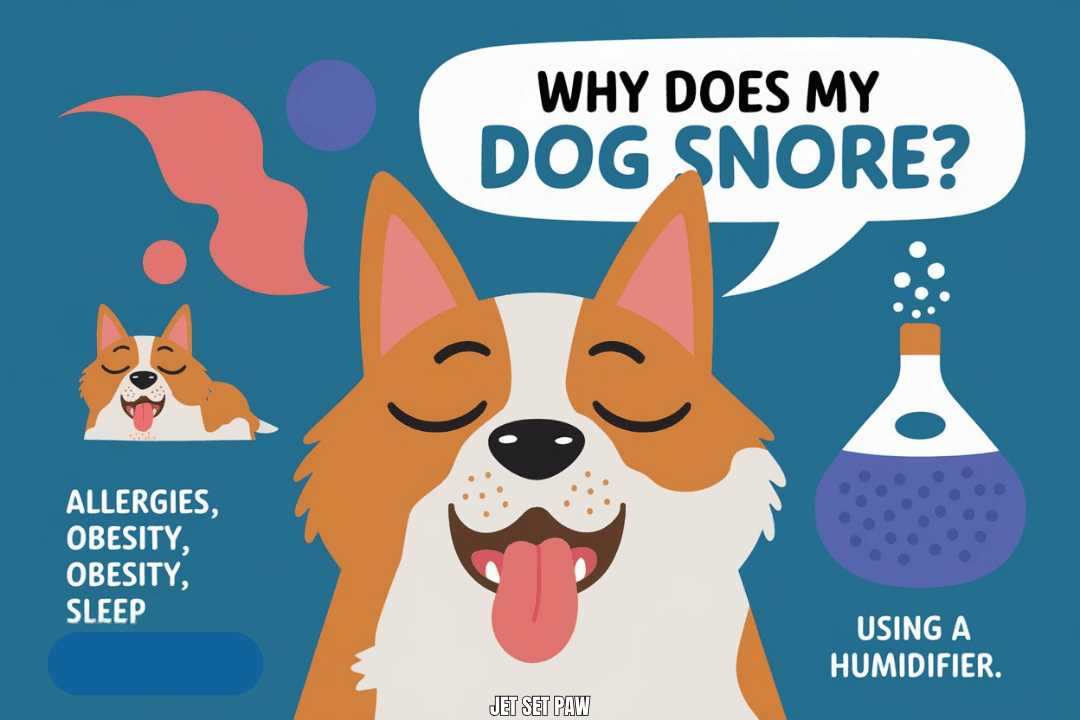Have you ever heard strange noises coming from your sleeping dog? If so, your furry friend might be snoring!
Snoring happens when air can’t flow smoothly through the nose or throat during sleep, causing the surrounding tissues to vibrate and make that familiar rumbling sound.
Just like humans, dogs can snore, too. While it might initially sound cute or funny, it’s essential to understand that dog snoring isn’t always typical.
Dogs snore for several reasons, and knowing these can help pet owners take better care of their four-legged companions.
Understanding why your dog snores can significantly affect their overall well-being, whether due to their breed, age, weight, or health issues. Let’s explore the various causes of dog snoring and what you can do about it.
Common Reasons for Dog Snoring
One of the most common reasons for dogs snoring is related to their anatomy and breed characteristics. Some dogs are more likely to snore because of their build.
Flat-faced breeds, or brachycephalic dogs, are especially prone to snoring. These include breeds like Bulldogs, Pugs, and Shih Tzus.
Their short noses and flat faces can make air flow harder, leading to snoring. It’s just part of who they are!
Another common cause of snoring in dogs is excess weight. Overweight dogs often have extra tissue in their throat area, which can partially block their airways when they sleep. This extra tissue vibrates as air passes through, causing snoring.
The way your dog sleeps can also affect whether it snores. Some sleeping positions, like lying on its back, can make snoring more likely. This is because gravity pulls the tongue and soft palate back, potentially blocking the airway.
Lastly, as dogs age, they may start to snore more. This is because the muscles in their throat can become weaker, making it easier for the airway to become partially blocked during sleep. It’s similar to how some older people snore more than younger people.
Understanding these common reasons for dog snoring can help you determine why your furry friend might be making those nighttime noises. In many cases, it’s perfectly normal and nothing to worry about!
Medical Causes of Dog Snoring
While snoring can be regular for some dogs, it can also be a sign of a medical issue. Knowing these potential causes is essential to keep your furry friend healthy.
Allergies and respiratory infections can cause snoring in dogs. Just like humans, dogs can get stuffy noses from allergies or colds.
This congestion can make it harder for them to breathe, especially when they’re sleeping, leading to snoring.
If your dog suddenly starts snoring and seems to have other symptoms like sneezing or runny eyes, allergies or an infection might be the cause.
Sometimes, dogs might snore because of obstructions in their airway. This could be due to foreign objects they’ve accidentally inhaled, like small toys or grass.
In more serious cases, tumors or growths in the throat or nasal passages can also cause snoring. These obstructions make it difficult for air to flow smoothly, resulting in those snoring sounds.
Believe it or not, dogs can also suffer from sleep apnea like humans. This is a condition where breathing repeatedly stops and starts during sleep.
It’s more common in overweight dogs and certain breeds with flat faces. If you notice your dog snoring loudly and their breathing seems to pause during sleep, it could be a sign of sleep apnea.
Remember, if your dog’s snoring is new, loud, or accompanied by other unusual symptoms, it’s always best to check with your vet.
They can help determine if the snoring is just a harmless quirk or a sign of a medical issue that needs attention.
Environmental Factors
The environment your dog sleeps in can also significantly affect whether it snores. Let’s look at common environmental factors that might make your furry friend more likely to snore.
Dry air can be a sneaky cause of dog snoring. When the air is too dry, it can irritate your dog’s throat and nasal passages, making them more likely to snore.
This is especially common in winter when indoor heating dries the air. If you notice your dog snoring more during dry seasons, this could be the reason.
Secondhand smoke is another environmental factor that can lead to snoring in dogs. Just like with humans, tobacco smoke can irritate a dog’s airways and cause inflammation.
This irritation can make it harder for your dog to breathe normally, especially during sleep, leading to snoring. If someone in your household smokes, it’s best to do it outside and away from your pets.
Lastly, dust and allergens in your dog’s sleeping area can trigger snoring. Pollen, dust mites, or mold spores can irritate your dog’s respiratory system.
This irritation can cause swelling in the airways, making it harder for air to flow smoothly and resulting in snoring. Keeping your dog’s bed clean and regularly washing their bedding can help reduce these allergens.
By paying attention to these environmental factors, you can help create a healthier sleeping environment for your dog. This will reduce snoring and improve sleep quality and health.
When to Be Concerned About Your Dog’s Snoring
While dogs’ snoring is often harmless, there are times when it might be a sign of something more serious. It’s essential to pay attention to your dog’s snoring patterns and any changes that occur.
If your dog suddenly starts snoring when it has never done before or if its snoring becomes much louder or more frequent, it could be a reason for concern. These changes might mean that something is affecting your dog’s breathing.
Watch out for other symptoms that accompany snoring. If your dog seems to have trouble breathing during the day, coughs a lot, or seems more tired than usual, these could be signs of a bigger problem.
Also, if you notice your dog struggling to breathe while sleeping or if it stops breathing for short periods, it’s time to take action.
When should you take your dog to the vet because of snoring? If you notice any of the abovementioned changes or symptoms, having your dog checked out is a good idea.
Also, if your dog’s snoring is so loud that it’s disrupting their sleep (or yours), or they seem uncomfortable while sleeping, a vet visit is a smart move.
It’s always better to be safe and have a professional take a look, especially when it comes to your furry friend’s breathing and sleep.
Remember, you know your dog best. If something about their snoring or sleep seems wrong, trust your instincts and consult your veterinarian.
They can help determine whether the snoring is just a quirk or a sign of a health issue that needs attention.
Ways to Reduce Dog Snoring
Dogs, just like people, can sometimes snore. But there are ways to help reduce your dog’s snoring. Here are some simple steps you can take:
Weight management is essential. If your dog is overweight, it can make snoring worse. Extra fat around the neck can squeeze the airways, making breathing harder. Helping your dog lose weight through proper diet and exercise can often reduce snoring.
Adjusting your dog’s sleeping position can help, too. Some dogs snore more when they sleep on their backs. You can try gently moving your dog to its side when it’s sleeping.
You could also get a round dog bed that encourages it to sleep curled up, which can help keep its airways more open.
Improving air quality in your home can make a big difference. Use an air purifier to remove dust and allergens from the air.
Keep your home free of smoke, and make sure your dog’s sleeping area is clean and dust-free. In dry climates, using a humidifier can help keep your dog’s airways moist and less irritated.
Regular vet check-ups are crucial. Your vet can spot potential health issues that might be causing the snoring before they become serious. They can also give you personalized advice on how to help your specific dog with their snoring.
By following these steps, you can help your dog (and you) get a better night’s sleep. Remember, while some snoring is regular, if it suddenly gets worse or is accompanied by other symptoms, it’s always best to check with your vet.
Conclusion
Dog snoring is a common issue for many pet owners. Let’s quickly look at what we’ve learned and what you should remember.
Dogs snore for many reasons. Some breeds are more likely to snore because of how their faces are shaped. Dogs that are overweight often snore more.
Sometimes, snoring can be caused by health problems like allergies or infections. The place where your dog sleeps can also affect their snoring.
It’s important to pay attention to your dog’s health, including its sleep habits. If you notice changes in how your dog snores or if it starts showing other signs of not feeling well, it’s time to take action.
Keeping an eye on your dog’s snoring can help you spot potential health issues early.
Remember, if you’re worried about your dog’s snoring, talking to your vet is always okay. They’re there to help and can give you the best advice for your specific dog.
Don’t hesitate to reach out if you have concerns. Your vet can help determine if the snoring is just a harmless habit or a sign of something needing treatment.
Ultimately, understanding why your dog snores and knowing when to get help can make you and your furry friend happier and healthier. Keep loving and caring for your dog, and don’t forget that a good night’s sleep is vital for both of you!

